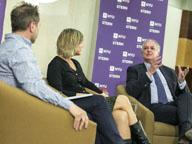Faculty News
—
Professor David Yermack's research on the blockchain is referenced
—

Excerpt from The Economic Times -- "It can be nice to imagine the much-derided banking industry unmoored from our daily needs, left to scramble for business like other non-essential industries. Of course, our transaction histories would be much more visible to governments than they are today . This imaginary world of effectively socialized money is being seriously discussed by researchers and central bankers alike. In a new paper, Max Raskin and David Yermack of New York University talk about it as a distinct possibility, albeit a radical one that 'carries significant risks for the rest of the financial system.'"
Faculty News
—

Excerpt from The Economic Times -- "It can be nice to imagine the much-derided banking industry unmoored from our daily needs, left to scramble for business like other non-essential industries. Of course, our transaction histories would be much more visible to governments than they are today . This imaginary world of effectively socialized money is being seriously discussed by researchers and central bankers alike. In a new paper, Max Raskin and David Yermack of New York University talk about it as a distinct possibility, albeit a radical one that 'carries significant risks for the rest of the financial system.'"




















